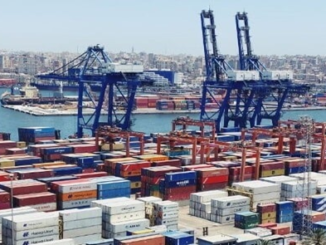
The Central Bank of Egypt’s Governor Tarek Amer considered the focus on defending the Egyptian pound over the past five years was a “grave mistake,” signaling the possibility of another devaluation after he weakened the currency by 13%in March.
In three separate newspaper, interviews, Amer-who took office in November-outlined views on the currency, the economy, and monetary policy. He said authorities can no longer delay measures that would control the use of foreign currency. He said that the CBE is focusing on reviving the economy rather than stabilizing the exchange rate under his leadership.
In an interview with the Cairo-based daily Al-Mal, Amer said, “We have two choices: either to keep the pound stable or to get factories working,” The exchange rate should reflect market and economic forces, he said. “I will make what I think are the right decisions, in my view, and bear the responsibility.”
Amer’s decision to devaluate Egypt’s currency, which he described as a “corrective move”, has failed to dominate in a thriving black market, undermining the CBE’s efforts to attract investments that would bolster its reserves and make more hard currency available for businesses. According to Bloomberg surveys, the Egyptian currency is trading at a discount of almost 20 % to its official rate versus the dollar.
The CBE statements infer the currency is to witness another devaluation. In this context, Hany Farahat, senior economist at Cairo-based CI Capital Holding, a unit of the country’s biggest publicly traded lenders said that it is “a clear signal that another round of devaluation is around the corner.” He added, “The governor reiterated the direction of opening up and liberalizing the pound, and adopting a more flexible exchange rate,” Farahat said.
According to Reham El-Desoki, senior economist at Dubai-based investment bank Arqaam Capital, she said that the timing of the next devaluation will depend on the central bank’s ability to inject foreign currency into the market after weakening the currency.
She said, “Once there are enough dollars to manage this step properly, they will devalue. “She added, “And this could happen in a month or two.”
According to local media reports, Saudi Arabia and the United Arab Emirates have pledged a total of about $4.5 billion in deposits and grants, of which $1.5 billion could materialize soon. The World Bank will release a $1 billion loan once Egyptian lawmakers approve value-added taxation. The African Development Bank has also pledged $500 million.
El-Desoki said, “In March, the CBE lacked the firepower to manage the exchange rate in a flexible manner.” She continued, “This time it could be different as they will be able to increase the availability of foreign currency and support the process.”
Accordingly, Egypt’s market is about to witness a further devaluation for the currency as Egypt’s foreign currency shortage intensifies and the gap between official and unofficial currency rates widens.
Egypt’s economy has been facing a severe shortage in foreign currency especially with the withdrawal of tourism sector and foreign investors that are the two major sources of hard currency.
In fact, the CBE has taken several steps to ease restrictions on dollar transactions since Amer took office. In March 14, the CBE devalued the currency which was the biggest one-time devaluation since 2003. By that time, policy makers expected they would adopt a more flexible exchange rate. However, the pound has been little changed in the central bank’s weekly foreign-exchange sale.
Since the devaluation, Egypt’s main stocks index added 6.45%. The EGX30 is among the 10 worst performers of all indexes Bloomberg tracks in dollar terms since the beginning of 2016.
However, Egypt’s devaluation of the pound in an effort to close the gap between the official and parallel rates but it failed to boost dollar liquidity or close the gap.
Reserves tumbled from $36 billion before the uprising to around $17.5 billion in May this year, and foreign currency reserves have been further drained this month as Egypt returned a $1 billion deposit to Qatar and paid $720 million in fees to the Paris Club.
On the other hand, some economic experts shed light on the importance of the timing if there would be further devaluation as it could trigger a jump in inflation if it is implemented early this year, economists say, a major concern in the country of 90 million where millions live hand to mouth.
Eman Negm, an economist at Prime Holding said, “There are other sources of inflationary pressures so they will wait until… end of the first quarter or early second quarter for the devaluation (to allow) inflationary pressures to be contained.” Egypt’s fiscal year starts in July.
In May, the annual urban consumer inflation jumped for the second month to 12.3% from 10.3% in April, pushing the Central Bank of Egypt to raise interest rates by 100 basis points at its monetary policy meeting last month.
Moreover, Inflation is expected to increase with the government’s plan to cut energy subsidies further and introduce a value-added tax this fiscal year seeking a loan from the international Monetary Fund (IMF).
“There is always a cost of any policy reform,” said one economist who remained anonymous. “You can’t fix everything at the same time. You either need to structurally reform the economy or just maintain everything at a standstill for fear of very high inflationary pressures.”



